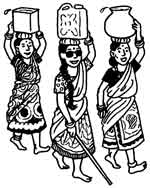Your progress
0%
These are the most important ideas that facilitate the empowerment of people with disabilities.
Use your mouse or keyboard to expand each of the headings below.
Many people with disabilities experience disempowerment both in the family and in the community. Although they are often strongly supported by their families, because family members do most things for them, they may also be over-protected. Government programmes that provide benefits, while well-intentioned, can often reinforce dependency. This undercuts the need to become self-reliant, and reinforces a feeling of powerlessness.
People with disabilities may also be rejected and excluded from community life because of stigma and discrimination. For example, people with intellectual disabilities often lack voice and choice as they are viewed to be “incapable” or “incompetent”. Their right to decide is denied. The identity of a person with disability is not confined to his or her impairment. Other socio-cultural factors such as class, religion, gender, ethnicity, education and occupation can also play a role in power relationships that exist in a community. For all of these reasons, people with disabilities often have very limited opportunities and choices. They become victims and objects of pity, not agents able to make a difference. The negative attitudes and low expectations lead people with disabilities to feel disempowered. Lacking resources and opportunities, people with disabilities are unable to fully participate in the community and are disempowered.
Empowerment is a complex process, it is not something that happens immediately or that can be given to someone.
Change must start wheresociety has failed to recognize the rights of people with disabilities and has created attitudinal, institutional and physical barriers. An active and positive attitude on the part of people with disabilities is also important for overcoming these barriers. Empowerment of people with disabilities can be facilitated by:
Increased empowerment can lead to greater control and improved decision-making.
To learn more, use your mouse or keyboard to expand any of the headings below.
Awareness is the level of understanding that individuals have of:
Raising awareness in individuals helps them recognize that there are opportunities for change.
Raising awareness in families and communities about disability issues and human rights can help to remove barriers for people with disabilities. This will enable them to experience greater freedom for participation and decision-making.
Information is power, and one of the key activities of CBR programmes is to disseminate accurate and relevant information.
Very often people with disabilities, their families and people in need have little or no access to basic information about their rights and entitlements. Providing information ensures that they will be better equipped to:
It is impossible for people with disabilities to take effective action and bring about change unless they have information that is relevant, timely and in accessible format
People with disabilities need a range of skills and knowledge to enable them to participate and contribute meaningfully to their families and communities.
Gaining skills and knowledge can lead to increased confidence and self-esteem, which is an important part of the empowerment process.
Many people with disabilities feel they are the only ones facing a particular problem. But when they meet people who have similar problems, they may see that their problems are shared, and that there are common solutions.
Being together helps to minimize isolation and increase mutual support
Being a contributor brings social recognition and is important in the empowerment process.
People with disabilities have the right to participate and can make positive contributions at many different levels. For example:
At a household level: they can participate in activities such as:
At a community level, they can:
Article 12 of the UN Convention on the Rights of Persons with Disabilities (CRPD) guarantees that “all people with disabilities enjoy legal capacity on an equal basis with others in all aspects of life”. This means that all people with disabilities have the right to make everyday decisions like what to wear and eat to more complex decisions about money and medical issues.
The CRPD also recognizes that some people may need support to make decisions. With support, all people with disabilities, including people with intellectual disabilities, are able to make decisions and have control in their lives.
Support for decision-making can take many forms, including:
For people with more significant support needs and/or difficulties in communicating, support could be a network of people who express and articulate decisions based on the will and intent of the individual.

Inclusion concerns everyone, and voices can be more strongly heard when different discriminated groups join their voices to advocate for a common goal.
Inclusion works well when other groups are involved too; with collective action, there is greater community ownership.